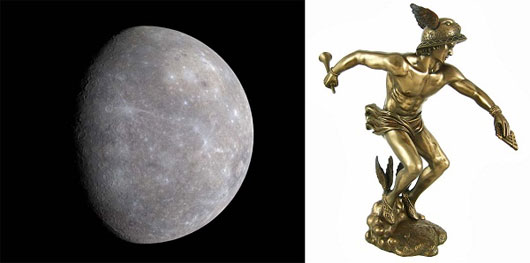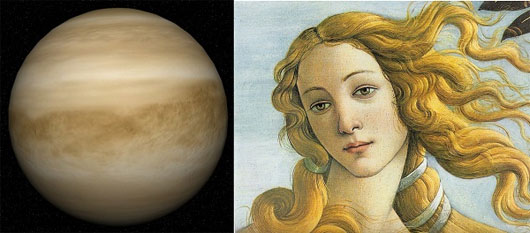The truth after each name of the familiar planets
Back in history, discovering how to name the planet in the West through ancient myths .
For Vietnam, the name Mercury, Venus or Saturn must be familiar when we call the planets in the Solar System. In Western countries, celestial bodies are named after gods originating in ancient Greece.
After the Romans rose to rule the Mediterranean, they absorbed the rich mythological treasures of the Greeks. Many Greek gods were renamed in Roman gods, for example Zeus changed to Jupiter. Those Roman names became routine for Western astronomers when they named the solar system celestial bodies.
1. Mercury

Mercury is the closest planet to the Sun and can only be observed at sunrise or sunset. The Greeks mistakenly thought it was two different stars and gave it two names: Apollo (at dawn) and Hermes (at sunset).
By the fourth century BC, they realized this was just a single planet. Later, the Romans chose Mercury (version of Hermes) as the planet's official name.
Of the five planets known since ancient times, Mercury is the fastest moving planet in the sky. This made the Western people think of Mercury - the god of the lightning-fast messenger in ancient myths.
2. Venus

Venus is the third brightest celestial object in the sky, less than the Sun and the Moon. The bright light of Venus makes the ancient Western people think of the Greek goddess of love and beauty Aphrodite. Later, the Romans called this goddess Venus or also known as the Venus Goddess.
In ancient Greece, there was a time when people mistook Venus for being two different stars, just like we used to have the concept of Sao Hom and Sao Mai.
3. Mars

Calculated from the center of the Solar System, Mars is the fourth planet. Iron oxides on the surface of Mars make this planet a prominent orange red. Perhaps this color has made the ancients think of the color of blood and soldiers.
The ancient Romans called Mars Mars - the god of war. In Greek mythology, Mars is Ares, son of Zeus and goddess Hera.
4. Jupiter

Jupiter is the largest mass planet in our Solar System. In the planets, Jupiter's light is only poor after Venus. The ancient Westerners named this planet Jupiter, the king of the gods.
Later, astronomers discovered many satellites orbiting Jupiter. Many satellites are named after girls who are seduced by myths of Jupiter.
5. Saturn

In Western countries, Saturn is called Saturn - Roman and time-governed god of agriculture. Saturn's prototype is the god Cronus in Greek mythology.
According to legend, the god Cronus took the goddess Rhea and gave birth to six children, including three sons, Zeus, Poseidon and Hades. Fearing that a child would betray me, Cronus swallowed all his children. Later, Cronus was deposed by his son Zeus.
6. Uranus

In 1781, British astronomer William Herschel discovered Uranus, the seventh planet of the Solar System. At first, people named the Uranus Georgium Sidus to honor King George III of England but was not accepted.
Finally, scientists decided to adhere to the tradition of the ancients - using a god's name. The seventh planet is called Uranus - the god of the sky and grandfather of Zeus. This is also the only planet named after Greece and not the Roman name.
7. Neptune

By 1846, the French mathematician Urbain Le Verrier discovered Neptune. The planet was named Neptune, the Roman god ruled the whole sea and rivers.
Neptune was originally the Greek god Poseidon. This god often carries with him a trident that has the ability to call rain and wind. Poseidon is also the brother of Zeus.
8. Pluto

In 1930, American mathematician Clyde Tombaugh discovered Pluto when he was only 24 years old. Venetia Burney, an 11-year-old female student in Oxford, England was the first to suggest naming the new planet Pluto - the god of hell under control (ie the Greek god Hades). Her proposal was fully supported by scientists.
It was not until 2006 that Pluto was considered the 9th planet of the Solar System. Today, it has been 'knocked out' as a 'dwarf planet', because it does not satisfy scientists' new definition of the planet.
9. Dwarf planet Ceres

In 1801, Italian astronomer Giuseppe Piazzi discovered a small stone planet between Mars and Jupiter. Astronomers named this planet Ceres, goddess of agriculture and crops. She is the Greek god Demeter, a sister of Zeus. Her daughter, Persephone, was taken down by the god Hades to be her wife.
Although Ceres is a planet, Ceres is very small, smaller than the Earth's Moon. Today, Ceres is classified as 'dwarf planet'.
10. Planet Eris

In 2005, astronomers discovered that a planet outside the Solar System is approximately the size of Pluto and calls it the "10th planet".
This planet is named Eris - the goddess of discord. In myth, Eris rolled the 'most beautiful gold' apple into the party, causing the goddesses Hera, Athena and Aphrodite to argue with no one.
Eris also brought a "discord" to astronomers, prompting the International Astronomical Society (AIU) to argue about the planet's definition. The result was a year later, both Eris and Pluto were ranked as 'dwarf planets'.
- Unknown mystery about planets outside the solar system
- Discover more 18 large planets
- Why are planets spherical, and meteorites?
- 8 planets are not true to haunt the scientific world
- Discover more than 700 planets outside the solar system
- Planets in the Solar System
- Dead planets may be signaling in outer space
- What do familiar objects look like once upon a time?
- Extremely familiar items will
- Why the dead planet?
- Does a true drug exist?
- Detecting the outer three planets about the size of the Earth
 'Fine laughs' - Scary and painful torture in ancient times
'Fine laughs' - Scary and painful torture in ancient times The sequence of numbers 142857 of the Egyptian pyramids is known as the strangest number in the world - Why?
The sequence of numbers 142857 of the Egyptian pyramids is known as the strangest number in the world - Why? History of the iron
History of the iron What is alum?
What is alum?